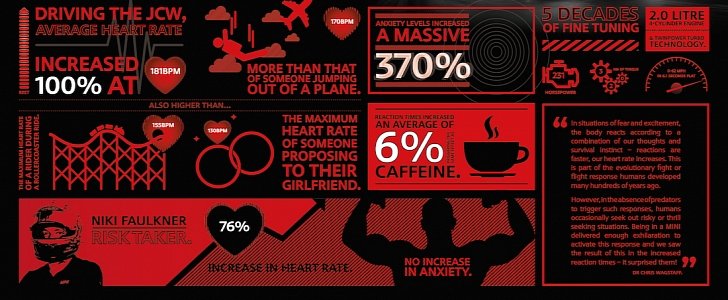Earlier this year, we showed you a couple of shots of people, journalists, experienced drivers and average Joes meeting up at the Goodwood track with a MINI John Cooper Works model. Back then we didn’t know exactly what was going on but now we can tell you that it was all an experiment carried out by the University of Portsmouth.
The researchers were actually trying to find out how driving a fast car affects you and the ones around you. To do so, they got stunt driver Niki Faulkner to jump behind the wheel and show us what he’s got.
The numbers were rather interesting, to say the least. Anxiety levels went up by a massive 370 percent from rest while the average heart rate went up 100 percent to 181 beats per minute. To put it differently, imagine that these figures are four times higher than when watching a horror movie. Furthermore, jumping out of a plane usually gets your heart up to 170 beats per minute so driving along in the JCW was even more intense for some people.
“In situations of fear and excitement, the body reacts according to a combination of our thoughts and survival instinct – reactions are faster, our heart rate increases. This is part of the evolutionary fight or flight response humans developed many hundreds of years ago. However, in the absence of natural predators to trigger such responses, humans occasionally seek out risks or thrills,” said Dr. Chris Wagstaff about the results they recorded.
In short, here are the key numbers you need to know about, that sort of explain our need for adrenaline and speed:
The numbers were rather interesting, to say the least. Anxiety levels went up by a massive 370 percent from rest while the average heart rate went up 100 percent to 181 beats per minute. To put it differently, imagine that these figures are four times higher than when watching a horror movie. Furthermore, jumping out of a plane usually gets your heart up to 170 beats per minute so driving along in the JCW was even more intense for some people.
“In situations of fear and excitement, the body reacts according to a combination of our thoughts and survival instinct – reactions are faster, our heart rate increases. This is part of the evolutionary fight or flight response humans developed many hundreds of years ago. However, in the absence of natural predators to trigger such responses, humans occasionally seek out risks or thrills,” said Dr. Chris Wagstaff about the results they recorded.
In short, here are the key numbers you need to know about, that sort of explain our need for adrenaline and speed:
- The average heart rate increased by 100% when driving
- The average heart rate increased by 80% whilst as a passenger
- The maximum heart rate achieved as a driver was 181 beats per minute, and was 153 beats per minute on average
- The maximum heart rate achieved as a passenger was 153 beats per minute, and was 127 beats per minute on average
- From rest to being a passenger self reported anxiety increased by 288%
- From rest to driving self reported anxiety increased by 370%
- Average reaction time performance improved by 6% after driving
- Average reaction time performance improved by 4% after being a passenger
- The maximum heart rate of a rider during a rollercoaster ride was 155 beats per minute
- The average beats per minute of someone jumping out of a plane was 170 beats per minute
- The maximum heart rate of someone proposing to their girlfriend was 130 beats per minute
